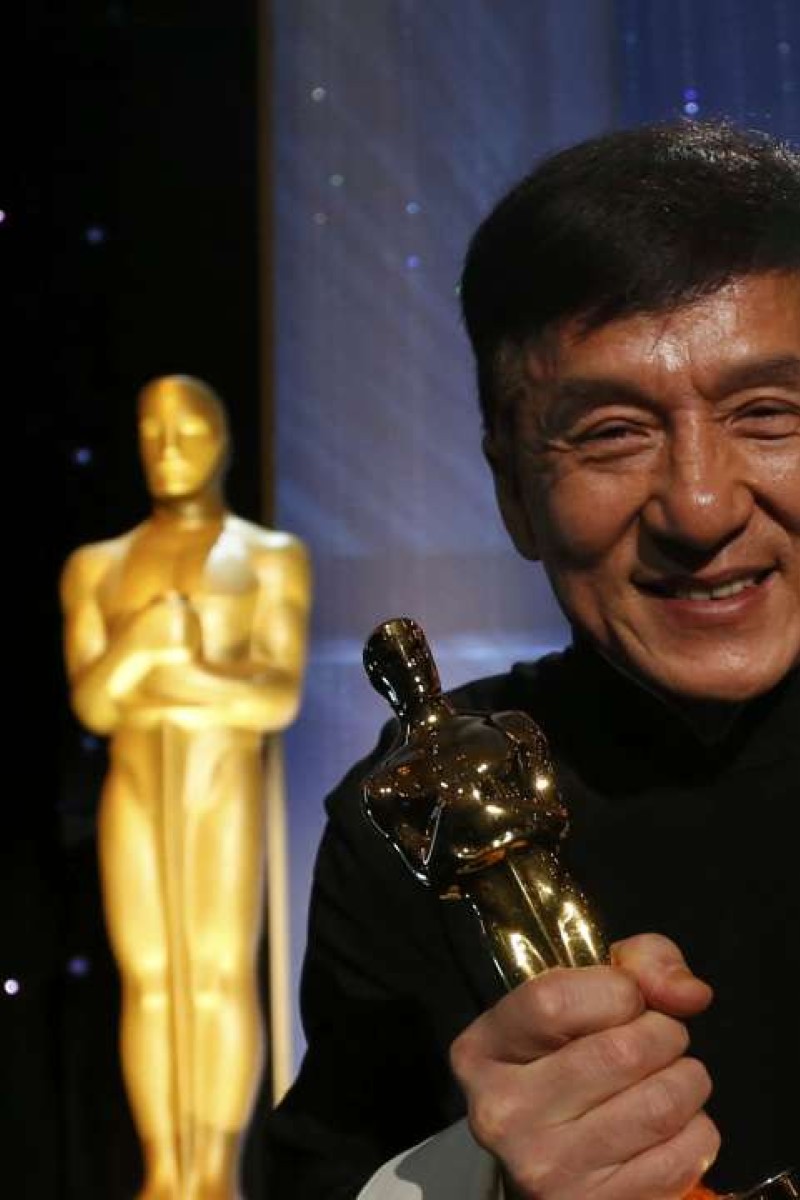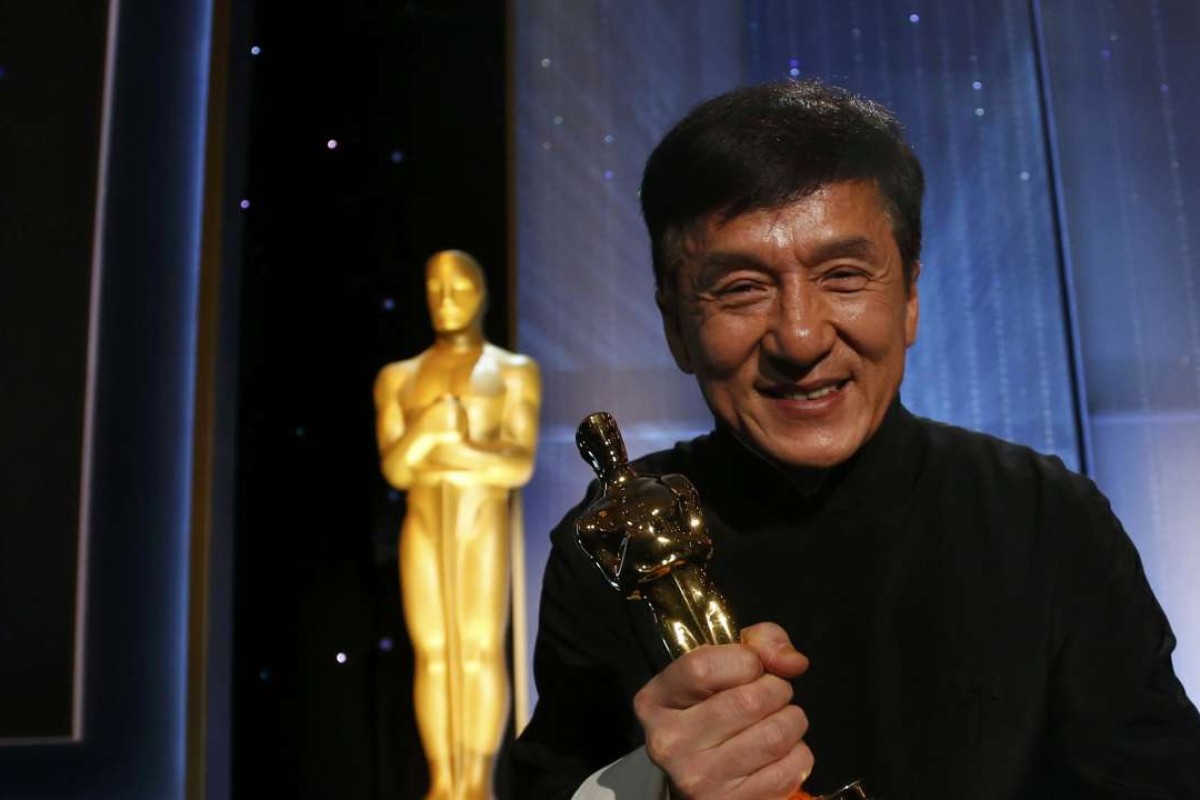
Jackie Chan - screen legend, Cantopop icon and Hollywood’s favourite martial artist - is Chantastic, and the world agrees
As Hollywood rolls out the red carpet, the philanthropist and recent Honorary Academy Award recipient talks about winning an Oscar, films and global recognition
 Jackie Chan received an Honorary Award at the 8th Annual Governors Awards in November.
Jackie Chan received an Honorary Award at the 8th Annual Governors Awards in November.When Jackie Chan picked up the world’s most prized golden statuette at the Governors Awards in Hollywood last November, he did so in characteristic comedic fashion. After a gracious acceptance speech, the band began to play him off, only for a frenetic Chan to signal they stop so he could thank his fans. It brought laughter and applause across the room, reactions the 62-year-old has garnered throughout his 56-year career.
The Oscars have seen their fair share of controversy in recent years, but movie stars, critics, and fans alike welcomed Chan’s award with overwhelming delight.
“Saluting a childhood hero of mine,” tweeted fellow Oscar winner Lupita Nyong’o, while Chris Tucker thanked his Rush Hour co-star, “for making a lot of people rich”.
“I am very thankful,” Chan says of being given Hollywood’s highest accolade. “It proves that if you keep trying hard for your dreams, one day there will be recognition.”
The Oscar dream first stirred in 1993 after a visit to Sylvester Stallone’s house, but the journey to centre stage in the Ray Dolby Ballroom began decades before. In 1960, a six-year-old Chan – Pao-pao, or “Cannonball” to his parents – enrolled at the China Drama Academy; a Karate Kid-style training centre for martial arts and Peking Opera. Two years on, and the cannonball shot onto the silver screen in Big and Little Wong Tin Bar.
200 films later, and the Jackie Chan name has become a global cinematic brand. Its trademarks are well-defined: the Buster Keaton-inspired action comedy, self-performed stunts, use of improvised weapons, and a stunning physical prowess. He’s a perfectionist with a tireless work ethic.
For the man behind such hits as Drunken Master, Rumble in the Bronx, and Project A, success is down to a simple formula: “Most of the time, people are fighting. There isn’t much dialogue. That’s why my movies can be distributed all over the world.”
His international reach has crossed genres; from gangster (Shinjuku Incident) to buddy cop (The Shanghai trilogy). He’s even ventured into animation, voicing Master Monkey in the Kung Fu Panda franchise. “My audience knows I will give them something different every time. I like to surprise them,” he says.
With the help of his JC Stunt Team, celebrating its 40th anniversary last year, Chan continues to surprise cinema-goers. Whether it’s swinging from ropes in Miracles, or whirling around a step ladder in Police Story 4: First Strike, the Victoria Peak-native never fails to entertain.
His slapstick style and bankable appeal – to the tune of HK$13 billion – has attracted a Hollywood who’s who of co-stars; Owen Wilson, Michelle Yeoh, and our very own Andy Lau. Even Bollywood has come calling, casting Chan as an oriental Indiana Jones in Kung Fu Yoga. Even though he’s seen almost everything the industry has to offer, Chan admits he’s happiest when he’s in a working environment.
“I just love taking care of everything and being on set all the time. Movies are my life,” he confesses.
His passion for the business still burns, even while the landscape has changed dramatically since he first punched and kicked his way onto the big screen. The box office is now the territory of comic book franchises and groundbreaking technology (as Chan recalls seeing on the set of Avatar). But he believes audiences still have an appetite for his pictures: “My audience expects authenticity. Authenticity gives power to a movie. That’s why I am still doing my own stunts.”
The literal blood, sweat and broken bones (23 to date), Chan has tallied up during his career has helped to raise the profile of action comedies, martial arts and Hong Kong-Chinese cinema across the globe. These have gone largely unnoticed by the Academy Awards, a point Tom Hanks highlighted at the Governors Ball. As the first Hongkonger to receive an award, Chan sees it as a turning point in the industry.
“The Chinese movie market is expanding at an astonishing rate. With more investment, there will be more Oscars recognition in the future.”
The city and the mainland have a mere four nominations to date. In just two years, however, it will be the world’s biggest film market. It’s a vibrant industry, with an increasingly enthusiastic audience. The mainland’s cinematic revolution has already made great leaps forward; Jiang Wen and Donnie Yen starred in Rogue One, and Matt Damon can be seen defending The Great Wall. With a deep understanding of both the Chinese and US markets, Chan shares his thoughts on the emerging super power: “International filmmakers have set their sights on China for future projects. Hollywood stars and directors are coming. This collaboration will see filmmakers learn from each other, and bring the audience more well-produced films.”
How times have changed since Chan first sought the American Dream in the eighties. “When I began shooting movies in the US, Americans didn’t care about my ideas. No one listened to my opinion,” he told one reporter. Nowadays, he believes local actors and filmmakers are becoming a more mainstream presence. To those looking to follow in his high-kicking footsteps, his advice is simple: “Do not be afraid of hardship. You must try your best.”
Even at 62, there’s no sign of Chan calling it a day. This year will see him headline six movies, including Russian fantasy flick Viy-2, alongside fellow action icon Arnold Schwarzenegger.
When he’s not evading capture in a rollerblade suit (Chinese Zodiac) or dressing up as Chun-Li (City Hunter), Chan dedicates his time to Unicef, serving as a Goodwill Ambassador since 2004. Back in December, he travelled to New York to celebrate the organisation’s 70th anniversary. “I am so blessed, so I actively participate in all kinds of charitable work to help the poor and people in need,” he reflects.
His humanitarian work, much like his contribution to cinema, is unmatched. As Oscars President Cheryl Boone Isaacs highlighted, Chan is “a true pioneer and legend in his craft.”
Despite building a career on chopping away at his on-screen rivals, Chan is surprisingly profound when looking back: “I often play a man who loves peace, and believes that enemies can become friends. I try my best to spread that message to those around me and in my films. That is the legacy I want to leave behind.”
He really is Chantastic!
Edited by Ginny Wong